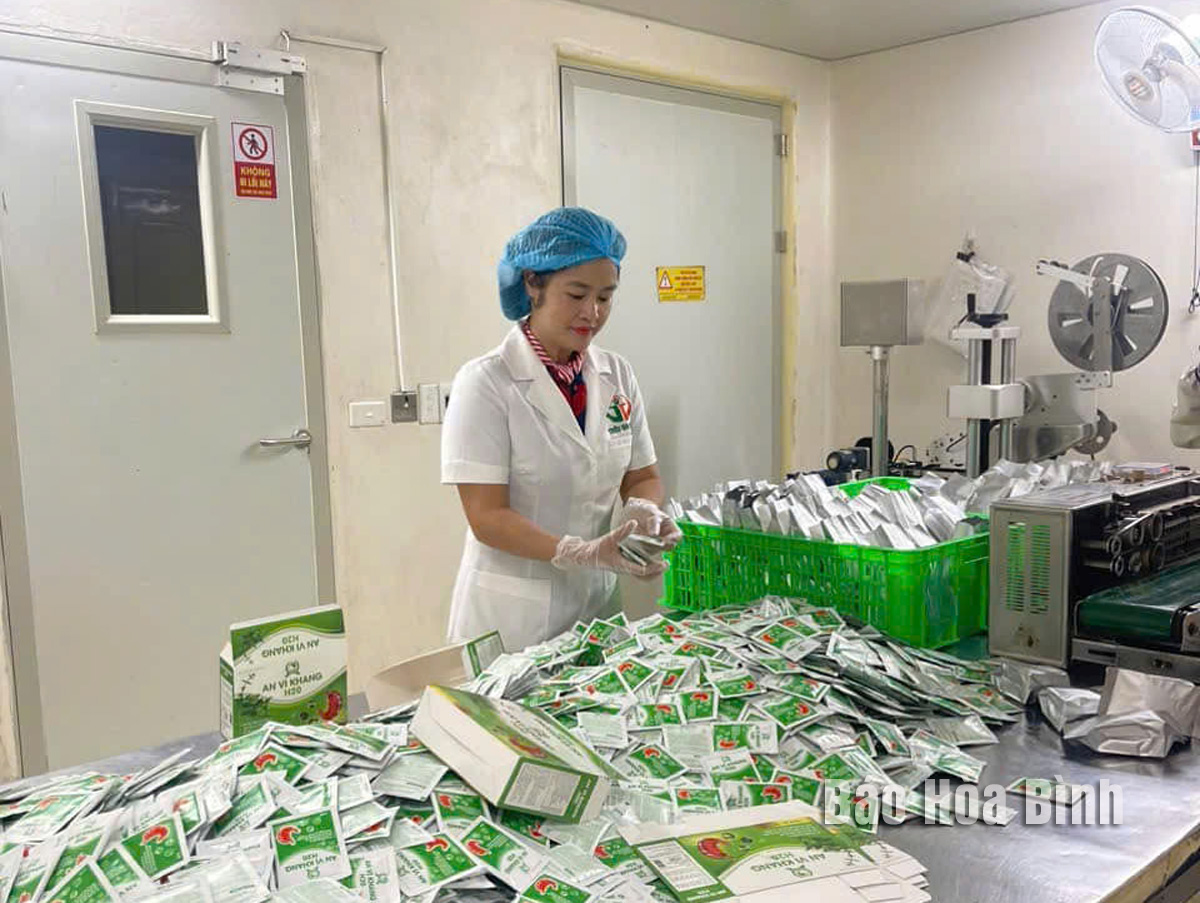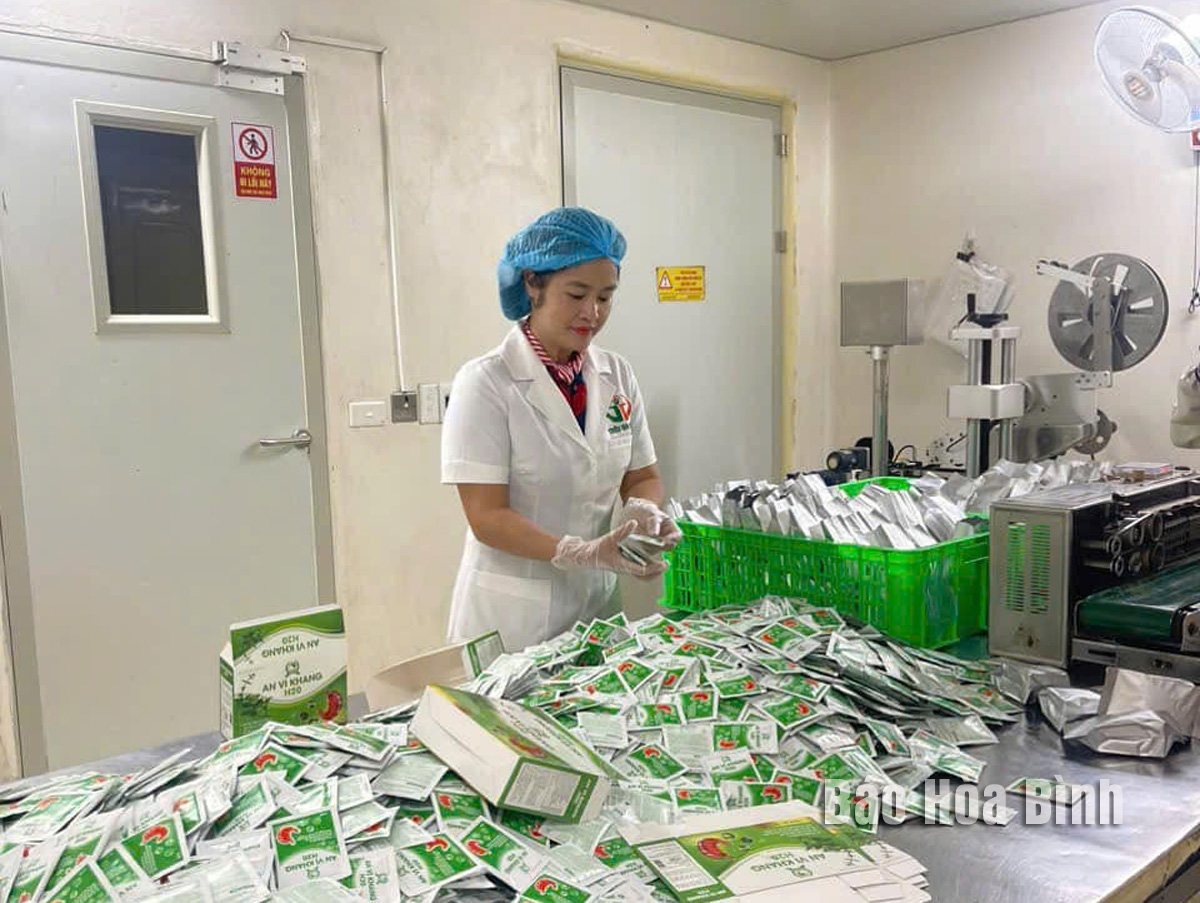
From just 16 certified products in its inaugural year to 158 by early 2025, the One Commune One Product (OCOP) programme in Hoa Binh province has followed a steady and strategic path. But beyond the numbers, it has reawakened local heritage, turning oranges, bamboo shoots, brocade, and herbal remedies into branded, market-ready goods - and, more profoundly, transformed how local communities value and present their own cultural identity.
Vietnam Medicinal Materials Cooperative (Residential Zone 6, Quynh Lam ward, Hoa Binh city) owns a number of products that have achieved 3-star OCOP and is continuing to develop new lines in the direction of standardisation and clear traceability.
From local produce to national brands
Once limited to district markets, Cao Phong oranges now feature QR-coded packaging and are sold in supermarkets and online marketplaces, even prepared for export. This success, led by cooperatives such as 3T Agricultural Cooperative of Cao Phong, has elevated the fruit - Hoa Binh’s first product with geographical indication - into a recognised national brand.
OCOP certification has raised the product’s value by 20–30% and helped reposition the Cao Phong orange in the domestic market, said Vu Thi Le Thuy, Director of the cooperative.
In another part of the province, the Tuyet Nhi Cooperative in Lien Son commune (Luong Son district) once cooked its herbal "ca gai leo” (solanum procumbens) extract over open fires for local customers. Thanks to OCOP support, the product now meets international HACCP standards, has professionally designed packaging, and boasts 4-star certification. More importantly, the business has created a new supply chain - encouraging farmers in nearby communes to cultivate the herb, boosting incomes and spreading OCOP’s model of value-added agriculture.
Perhaps most impressively, Hoa Binh’s first 5-star OCOP products came not from high-end goods, but from humble bamboo shoots. Dried and pickled varieties produced by Kim Boi joint Stock Company in Ba Hang Doi township of Lac Thuy district received national OCOP certification in January 2025. What was once a simple local dish is now a product processed, packaged and exported internationally.
Breathing new life into traditional crafts
In Lac and Pom Coong villages of Mai Chau district, brocade textiles, once woven for bridal dowries, now appear in OCOP showcases, complete with branding and QR codes. This reflects a broader shift - OCOP isn’t just about agriculture, but also about preserving cultural identity through market integration.
With 74% of the province's population belonging to ethnic minority groups, including the Muong, Thai, and Dao, Hoa Binh is rich in cultural tradition. In areas like Mai Chau, Tan Lac, and Da Bac, OCOP has helped artisans professionalise their craft, offering training in product design, branding and tourism integration. From scarves and handbags to pillow covers and souvenirs, brocade items now feature at major cultural fairs in Hanoi and Ho Chi Minh City. Many international tourists take these home as keepsakes, allowing a piece of Hoa Binh's culture to travel with them.
In Hop Tien commune of Kim Boi district, forest honey produced by the Green Life Cooperative reflects another OCOP success story. The product, certified at a 4-star level, comes from a 5,000-hectare protected forest and is harvested in a way that supports both biodiversity and local livelihoods. Led by a team of young locals, the cooperative links its honey with eco-tourism offerings at nearby Kim Boi hot springs, helping to turn a simple product into a local signature.
Brocade from Mai Chau and honey from Hop Tien show that OCOP is more than an economic scheme - it’s also a cultural bridge. In Hoa Binh, each certified product speaks not only to quality and origin, but also to the land, its people, and their stories.
The programme has made a measurable impact on the local economy, improving incomes and reducing the poverty rate to 6.9% by the end of 2024. Nguyen Huy Nhuan, Director of the provincial Department of Agriculture and Environment, confirmed that Hoa Binh now aims to standardise an additional 160 products and launch at least 100 new OCOP businesses by 2030.
Every OCOP label - on a jar of herbal extract, a bamboo shoot package, or a brocade pouch - serves both as a quality mark and a proud declaration: "We are from Hoa Binh.” A land of mountains, resilience, and deep creativity, the province’s OCOP journey is far from over - driven by the belief that tradition thrives best when nurtured, renewed, and retold through the products of its people.
According to data from the Hoa Binh Provincial Party Committee, the industrial production index for the first six months of 2025 is estimated to have increased by 20% compared to the same period last year. This marks the highest year-on-year growth rate for this period since 2020.
In the first six months of 2025, Hoa Binh province’s export turnover was estimated at 1.145 billion USD, marking an 18.11% increase compared to the same period in 2024. Import turnover was estimated at $ 804 million, a 17.15% increase, which helped the province maintain a positive trade balance.
The lives of the ethnic minority farmers in Tan Lac district have gradually improved thanks to the new directions in agricultural production. This is a testament to the collective strength fostered through the professional associations and groups implemented by various levels of the district’s Farmers’ Union.
With the motto the "product quality comes first,” after nearly one year of establishment and operation, Muong village’s Clean Food Agricultural and Commercial Cooperative, located in Cau Hamlet, Hung Son Commune (Kim Boi district), has launched reputable, high-quality agricultural products to the market that are well-received by consumers. The products such as Muong village’s pork sausage, salt-cured chicken, and salt-cured pork hocks have gradually carved out a place in the market and they are on the path to obtaining the OCOP certification.
In the past, the phrase "bumper harvest, rock-bottom prices" was a familiar refrain for Vietnamese farmers engaged in fragmented, small-scale agriculture. But today, a new spirit is emerging across rural areas of Hoa Binh province - one of collaboration, organisation, and collective economic models that provide a stable foundation for production.
Maintaining growing area codes and packing facility codes in accordance with regulations is a mandatory requirement for agricultural products to be eligible for export. Recently, the Department of Agriculture and Environment of Hoa Binh province has intensified technical supervision of designated farming areas and packing facilities to safeguard the "green passport" that enables its products to access international markets.



